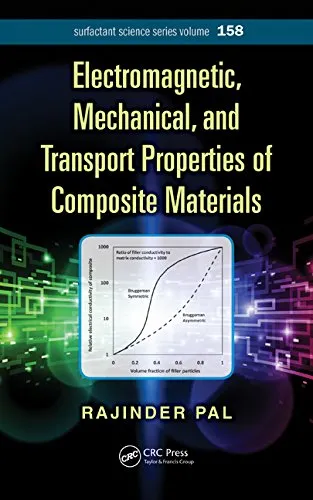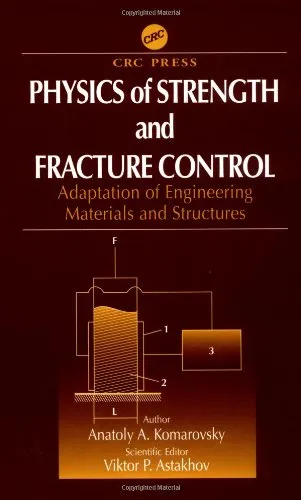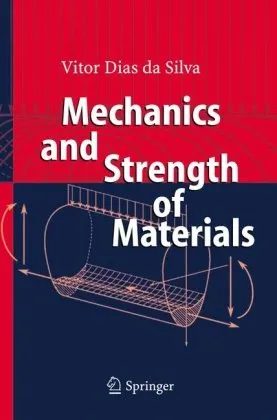Electronic basis of the strength of materials
4.5
بر اساس نظر کاربران

شما میتونید سوالاتتون در باره کتاب رو از هوش مصنوعیش بعد از ورود بپرسید
هر دانلود یا پرسش از هوش مصنوعی 2 امتیاز لازم دارد، برای بدست آوردن امتیاز رایگان، به صفحه ی راهنمای امتیازات سر بزنید و یک سری کار ارزشمند انجام بدینکتاب های مرتبط:
معرفی کتاب "Electronic Basis of the Strength of Materials"
کتاب "Electronic Basis of the Strength of Materials" یکی از آثار برجسته و مرجعمحور در زمینه بررسی خواص مکانیکی و الکترونیکی مواد است. این کتاب توسط من، John J. Gilman، نوشته شده و تلاش میکند تا با ارائهی دیدگاههای علمی و تطبیقی سطح بالایی از دانش در این حوزه را به خوانندگان منتقل کند. در ادامه به بررسی بخشهای مختلف این کتاب و اهمیت آن خواهیم پرداخت.
خلاصه دقیق از کتاب
این کتاب به بررسی بنیانهای علمی رفتار مکانیکی مواد از دیدگاه الکترونیکی میپردازد. تمرکز اصلی این اثر بر این است که چگونه خواص مکانیکی مواد نظیر استحکام، شکست، و خزش تحت تأثیر ساختار و برهمکنشهای الکترونها با هستههای اتمی قرار میگیرد. در این کتاب، مفاهیم اساسی نظیر Bonding، Dislocations، Energy Bands، و Elasticity از منظر تئوری و با مثالهای کاربردی توضیح داده میشوند.
یکی از نکات برجسته این کتاب، رویکرد بینرشتهای آن است که علم مواد، فیزیک جامدات و علوم مهندسی را برای توضیح رفتار پیچیده مواد ترکیب میکند. در همین راستا، این اثر تلاش میکند روشهایی را معرفی کند که به درک اصول بنیادین پشت استحکام مواد در سطح الکترونیک کمک کند.
نکات کلیدی
- فهم عمیق اصل Bonding در مواد مختلف و تأثیر آن بر خواص مکانیکی
- ارائه تحلیلهای دقیق درباره رفتار Dislocations در مواد بلوری
- بررسی ارتباط میان Energy Bands و خواص مکانیکی مواد
- معرفی مدلهای بهینهسازی ساختاری برای افزایش استحکام مواد
- نقد و تحلیل تئوریهای موجود درباره رفتار Elasticity و Plasticity
جملات معروف از کتاب
“Understanding the strength of materials requires not only knowledge of their microstructure but also a deep dive into their underlying electronic interactions.”
“The interplay between atomic bonding and mechanical properties is the essence of what defines material strength.”
چرا این کتاب اهمیت دارد؟
اهمیت کتاب "Electronic Basis of the Strength of Materials" در چندین جنبه است:
- این کتاب یک رویکرد منحصر بهفرد و علمی به تحلیل استحکام مواد ارائه میکند که در هیچ اثر دیگری به این شکل جامع موجود نیست.
- توضیحات دقیق و مثالهای عملی آن، به محققان و دانشجویان امکان میدهد تا مفاهیم پیچیده را به سادگی درک کنند.
- این اثر پایهای است برای مطالعات پیشرفته در زمینههای مهندسی مواد، فیزیک و شیمی جامدات.
- کتاب با ترکیب دانش نظری و کاربردی، پلی میان تحقیق آکادمیک و مهندسی کاربردی ایجاد میکند.
به طور کلی، این کتاب ابزاری کارآمد برای هر کسی است که علاقهمند به درک عمق علمی رفتار مکانیکی مواد و تأثیر برهمکنشهای الکترونیکی بر خواص آنها میباشد.
Introduction to "Electronic Basis of the Strength of Materials"
The study of materials science has long been a cornerstone in understanding the properties that define the world around us. My book, Electronic Basis of the Strength of Materials, delves into the intrinsic relationship between the electronic structure of materials and their mechanical properties. Designed to bridge the gap between theoretical insights and practical applications, this work offers readers a comprehensive exploration of how the quantum and electronic realms directly affect material strength.
By uniting concepts from physics, chemistry, and engineering, this book provides a detailed investigation into the nature of metallic, covalent, ionic, and van der Waals interactions and their role in determining mechanical strength, stiffness, and ductility. The intention behind this work is to inspire not only academic researchers but also practicing engineers to rethink how materials can be optimized and utilized for a rapidly advancing world.
Detailed Summary of the Book
The book begins by laying the foundation of material strength through a solid understanding of the electronic structure of atoms and molecules. In its early chapters, readers are introduced to quantum mechanics in the context of materials science, highlighting how fundamental forces at the atomic scale influence macroscopic properties like yield strength, toughness, and elasticity.
A significant portion of the book focuses on different types of bonds – metallic, ionic, covalent – and discusses how each contributes uniquely to the mechanical properties of materials. By investigating dislocations, defects, and other structural irregularities at the atomic scale, the book explains why certain materials exhibit brittleness while others are remarkably ductile and malleable.
The later chapters delve into advanced topics, such as the role of electronic density in resisting deformation, how cohesive energy correlates with strength, and why materials fail under extreme conditions. Modern computational methods like density functional theory (DFT) and molecular dynamics simulations are also discussed to provide insights into how theoretical models are used to predict strength and deformation behavior.
Ultimately, Electronic Basis of the Strength of Materials equips readers with a rigorous understanding of how atomic-level interactions define macro-level performance, paving the way for material innovations in aerospace, energy, construction, and beyond.
Key Takeaways
- Material strength is deeply rooted in electronic interactions at the atomic level.
- The type of bonding, including metallic, ionic, and covalent bonds, determines the mechanical behavior of materials.
- Defects and imperfections in crystals play a significant role in defining strength and fracture properties.
- Modern computational methods enable the prediction and optimization of material properties even before synthesis.
- Understanding electronic structures opens doors for designing materials tailored for specific engineering applications.
Famous Quotes from the Book
"The strength of a material is not merely a mechanical quantity but a manifestation of its electronic and atomic structure."
"All materials break, but how and why they break lies deeply embedded in their electronic architecture."
"The key to understanding the strength of materials lies in unifying quantum phenomena with mechanical principles."
Why This Book Matters
Electronic Basis of the Strength of Materials is not just a textbook; it is a call to rethink the origins of material properties and how they are engineered. In an age where technology demands ever-stronger, lighter, and more sustainable materials, this book provides the necessary theoretical foundation for innovations that meet these challenges. By addressing the topic from an electronic perspective, it opens new doors to understanding material phenomena that traditional mechanical approaches fail to explain.
Furthermore, the book serves as an invaluable resource for both researchers and industry professionals, offering insights that are both academically rigorous and practically accessible. From aerospace to nanotechnology, the principles discussed within its pages have far-reaching applications. This work is not only a tribute to the interplay of science and engineering but also a guide toward unlocking the next generation of materials.
دانلود رایگان مستقیم
شما میتونید سوالاتتون در باره کتاب رو از هوش مصنوعیش بعد از ورود بپرسید
دسترسی به کتابها از طریق پلتفرمهای قانونی و کتابخانههای عمومی نه تنها از حقوق نویسندگان و ناشران حمایت میکند، بلکه به پایداری فرهنگ کتابخوانی نیز کمک میرساند. پیش از دانلود، لحظهای به بررسی این گزینهها فکر کنید.
این کتاب رو در پلتفرم های دیگه ببینید
WorldCat به شما کمک میکنه تا کتاب ها رو در کتابخانه های سراسر دنیا پیدا کنید
امتیازها، نظرات تخصصی و صحبت ها درباره کتاب را در Goodreads ببینید
کتابهای کمیاب یا دست دوم را در AbeBooks پیدا کنید و بخرید
1397
بازدید4.5
امتیاز0
نظر98%
رضایتنظرات:
4.5
بر اساس 0 نظر کاربران
Questions & Answers
Ask questions about this book or help others by answering
No questions yet. Be the first to ask!














